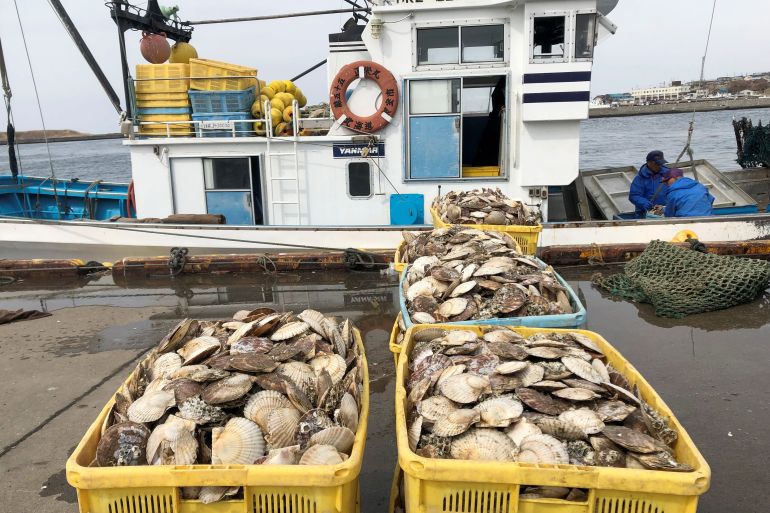Japan resumes seafood exports to China after ban over Fukushima wastewater
Beijing imposed a two-year ban over the discharge of treated radioactive wastewater from the tsunami-hit Fukushima plant

By Adam Hancock and News Agencies
Published On 7 Nov 20257 Nov 2025
Save
Japan has restarted seafood exports to China after Beijing lifted a two-year ban, which was implemented over the contentious release of treated radioactive wastewater from the tsunami-hit Fukushima Daiichi nuclear power plant.
Japan’s Chief Cabinet Secretary Minoru Kihara said on Friday that 6.6 tonnes of scallops were shipped to China on Wednesday, marking the first such delivery since Beijing banned Japanese seafood in August 2023.
Recommended Stories
list of 4 itemsend of list
The Fukushima Daiichi plant suffered triple meltdowns following a huge earthquake and tsunami in 2011, causing huge leaks of radioactive wastewater that needed to be stored in tanks.
More than 18,000 people perished in the initial disaster, and some 2,300 have died from deaths related to the aftermath in the region.
Japan started releasing treated radioactive water from the plant into the Pacific Ocean in August 2023, despite concerns among neighbouring countries. In response, Beijing banned seafood imports from Japan, citing the risk of radioactive contamination.
Tokyo said the release of the water was safe and supported by the International Atomic Energy Agency, the United Nations nuclear watchdog. It criticised China for spreading “scientifically unfounded claims”.
China announced it would lift the ban in June, following repeated negotiations between the two sides.
‘A positive move’
The agreed deal laid out several new procedures for Japan, whose fish processing facilities are required to register with China. Exporters also need to include certificates of inspection, guaranteeing that seafood has been checked for radioactive material.
Advertisement
The Chinese ban had inflicted a major blow on Japan’s seafood industry, especially scallop and seafood cucumber exports, with China the biggest overseas market for Japanese seafood.
“The government takes the development as a positive move,” said Kihara.
The scallops exported this week were harvested in Hokkaido prefecture, although Beijing is maintaining a ban on seafood from Fukushima and nine nearby prefectures.
Kihara said Japan will continue to urge Beijing to lift the remaining bans and resume importing Japanese beef.
China halted imports of Japanese beef in 2001 following an outbreak of bovine spongiform encephalopathy, popularly known as mad cow disease, in September 2001.
